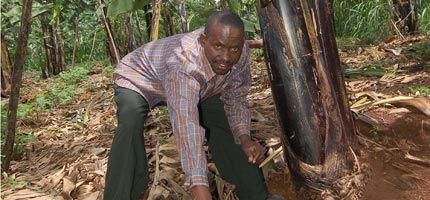© FLM/Fredrick Nzwili
[En inglés y alemán]
Rwanda: Salvar árboles, proteger los alimentos
Climate Change Impact Leaves Rwanda’s Rural Communities Vulnerable
Athanase Mugabo pointed at the withered crops of maize, beans, banana and cassava on his small farm in Kirehe District eastern Rwanda “I did not get any harvest this time, even after replanting,” Mugabo told Lutheran World Information (LWI) in March.
“The rains were not sufficient. They came in torrents at first, but went away after a few weeks. By the time they returned, the crops had withered,” explained Mugabo, who also serves as a pastor of the Lutheran Church of Rwanda (LCR) in Rusomo parish.
His plight is a stark reminder of how ordinary people across Africa are affected by climate change. Experts have warned that droughts and famines in Africa will worsen as weather-related uncertainties increase.
Many farmers, especially in eastern Rwanda, tell similar stories. The climate change phenomenon has left the majority of people, who are mainly subsistence farmers, extremely vulnerable.
There is an increasing number of droughts, floods and landslides, aggravating food insecurity and weakening the agriculture-based economies. Between 2004 and 2005 a vicious drought swept across the country, affecting three harvests and prompting appeals for food aid.
Schadrack Bazubafite, a former project coordinator of The Lutheran World Federation (LWF) Department for World Service (DWS) program in Rwanda explained that small rivers, springs, swamps, wetlands and lakes—the main sources of domestic water—are diminishing.
“It is common to hear complaints that it is much drier than it was about 10 years ago. The people are also saying the seasons have changed suddenly and they cannot successfully predict if the rains will come or not,” said the former DWS project coordinator.
“Many farmers, unaware of the climatic changes in the seasons, are still preparing their land for planting as usual, but get disappointed when the rains delay or fail,” said Bazubafite. “It is very discouraging for the people.”
Tree Planting
Adjusting to the climatic changes is a major challenge for most people in Rwanda, according to the National Adaptation Programme of Action (NAPA) published by the government in 2007. NAPA indicated that the use of adaptable crop varieties was crucial. However, most people grow banana, maize, beans and cassava for subsistence.
NAPA called for the development of an integrated water management strategy and early warning systems for weather pattern changes. It also urged an end to the widespread use of firewood for cooking, as it was decimating the tree cover and exposing soils to erosion. Reports indicate that Rwanda has lost about 60 percent of its forest cover in the past two decades.
In 2002 the DWS program launched an environmental rehabilitation, conservation and protection campaign. The initiative promotes reforestation by making seeds and seedlings available to community groups while providing training programs that emphasize the benefits of conservation.
Nearly 164,000 people are participating in agro-forestry in the DWS project areas in eastern Rwanda. Between 2007 and 2009 the program maintained 13 nurseries in the eastern province, which produced 1.5 million seedlings. The saplings were transplanted on 620 hectares. In 2009 alone, more than 500,000 tree seedlings were planted.
Biogas for Cooking and Lighting
The Rwandan government has been promoting the use of alternative sources of energy, such as biogas, aimed at changing the rural communities’ dependency on firewood for cooking. In 2009, the LWF program signed an agreement with the government for the construction of 100 biogas systems.
A farmer needs two cows (improved breeds) for manure to sufficiently run a biogas system, which produce gas that can be used for cooking and lighting. The manure residue from the system’s digester is used as fertilizer on farms.
“Since the day we installed a biogas system, my family no longer takes the journeys to the hills to collect firewood,” said Gahigi Stanislaus, a farmer from Ruyumba area in southern Rwanda. “This system has come as relief. We are saving some income through using the gas,” he said. He explained it was also becoming difficult to find firewood.
However, many of the rural farmers cannot afford the biogas installation costs estimated at around 800,000 Rwanda francs (USD 1,400) and the improved cow breeds. The government is developing smaller systems that are expected to be more affordable.
Energy-Saving Stoves
In 2000 DWS Rwanda introduced in its working areas energy-saving stoves known as Rondereza, which rural communities say are a more feasible measure toward cutting down on fuel wood usage.
The stoves came as a relief for many families that previously relied on the traditional three-stone stoves, which not only consumed huge quantities of firewood but also produced a lot of smoke, endangering especially the health of women and children. Subsequently the government issued a directive to all rural communities to use these energy saving stoves.
“When women started using the new stove, they realized that they could cook with two or three pots at the same time. They also realized the stove made cooking easier, faster and used less firewood,” said Mary Nkerenke, a 42–year- old farmer from Rukira sector in eastern Rwanda.
Nkerenke, like thousands of Rwandans, says she uses less wood and “saves a tree a day,” to help safeguard planet Earth.
LWF/DWS work in Rwanda started as an emergency response initiative following the 1994 genocide in the country, and gradually evolved into a humanitarian development program. DWS is winding up its activities, and the office will close down in June 2010.
By Nairobi (Kenya)-based LWI correspondent Fredrick Nzwili

